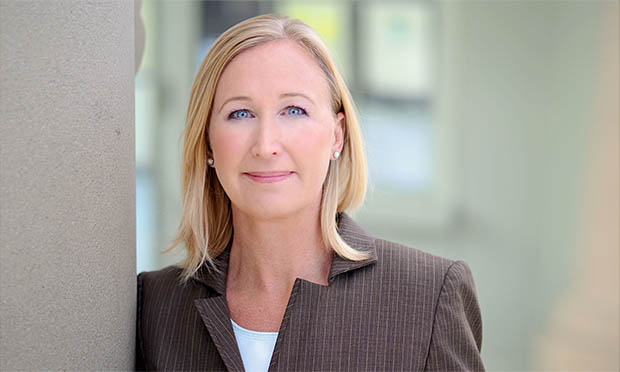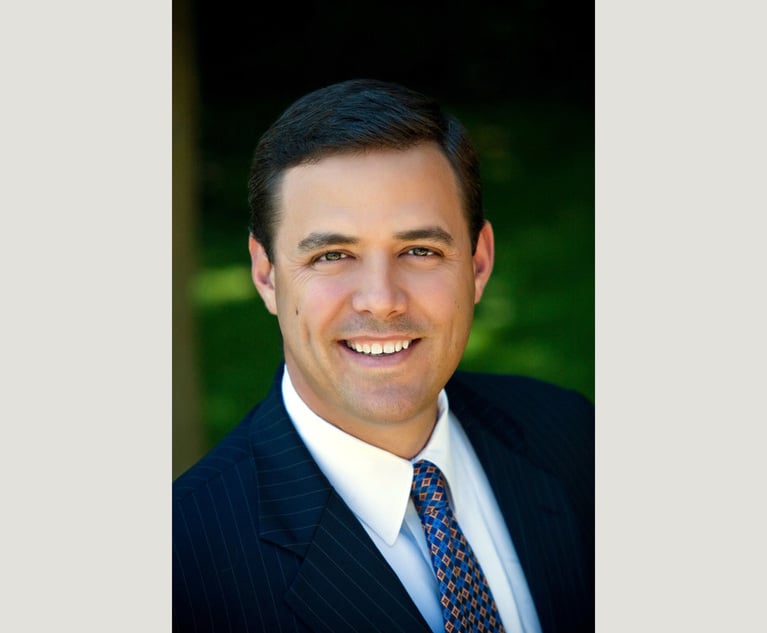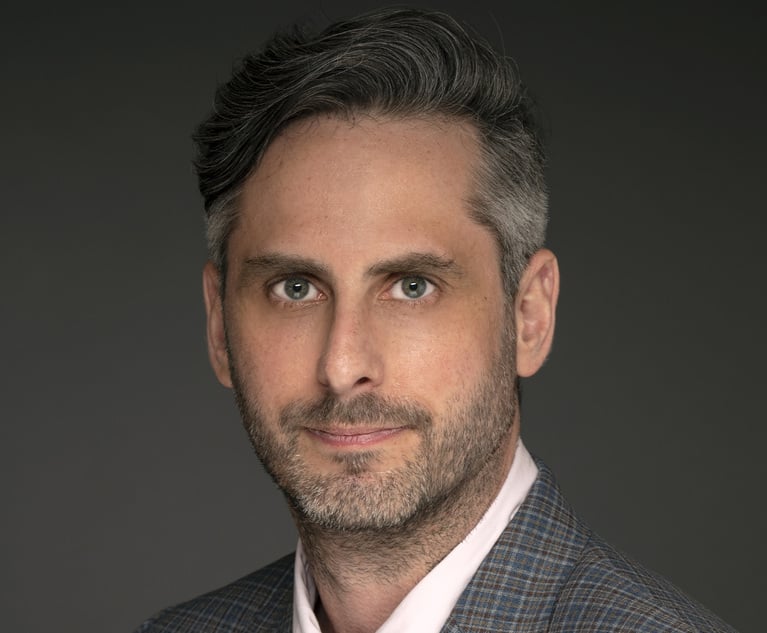Women Leaders in Tech Law 2018: Jennifer Seraphine, Turner Boyd
Seraphine won a federal court order last year finding that her client Rearden LLC is the rightful owner of the visual effects technology MOVA Contour—the facial capture system used in the film industry to record an actor's facial performance.
November 12, 2018 at 02:27 PM
5 minute read
 Jennifer Seraphine, partner, Turner Boyd (Courtesy photo)
Jennifer Seraphine, partner, Turner Boyd (Courtesy photo)
Seraphine won a federal court order last year for client Rearden LLC finding that it is the rightful owner of the visual effects technology MOVA Contour—the facial capture system used in the film industry to record an actor's facial performance for use in animation or computer graphics.
What's one way you've had to change your thinking toward practicing law to succeed with tech industry clients or in-house at a technology company?
I love working with engineers. My dad was (still is) an engineer, and I think I was trained from childhood how to relate. Still, I am careful to remember that they are sometimes coming at problems and issues from a very different mindset, and take the time to explain why we are handling things the way we are. Information-sharing is key.
What's one area of technology that you're most excited about and why?
I am fascinated with—and a little scared of—the combination of evolving robotics and artificial intelligence. (But then again, maybe I've watched too many episodes of “The Twilight Zone.”) I think that this technology is what will make changes such that we will have to explain to our children “what life was like before” it existed. I'm also selfishly praying for autonomous vehicles before my two sons start driving :)
No. 1 survival tip in a work crisis?
Go for a walk, figure it out, come back with a plan.
Name a lawyer whose work you admire and why?
My partner Karen Boyd. Karen is one of the brightest people I know, but beyond that she is also willing to make hard decisions about what to focus on in a case. When you are at a large firm, have a client with unlimited resources, and/or in a bet-the-company case, it makes sense to turn over every rock. In other cases, of which there are many, strategy is imperative. I've found that to win while being efficient and strategic is actually much more fun than when you have a memo on every issue. And as Karen says, “If you turn over every rock, you end up with a field of turned-over rocks.”
What's the best part about working in the tech sector?
I love learning something new in every matter I work on. And sometimes it's the things that seem the least interesting that end up being the most fun!
What's the biggest challenge?
It is challenging to change people's perceptions when I walk into a conference room. It's not just being a woman—being on the short side and blond doesn't help either :) Even though I think we've come a very long way, I still feel that initial resistance. It will be a great day when that is gone.
What piece of advice do you give to lawyers considering a career in tech law?
I don't have a technical background and have counseled many associates who were in the same position and would ask “can I really be a patent lawyer” without one? My advice was always to only do it if you really have an aptitude and love of learning technology. Don't do it if you hate math.
Name an important opportunity you got early in your career and what you did with it?
I was very fortunate when asked, or maybe better said allowed, as an associate to cross-examine an expert witness at trial. You probably think I'll talk about how great it was, but it wasn't. It was ugly. The partner in charge (the head of Jones Day's litigation group worldwide) described it as a 10-round boxing match, saying I was definitely bloodied but that I was the victor in the end. (I did get the expert disqualified.) What did I do with it? I learned how to do better cross-examinations! I also tell associates the story, so they always feel that they at least did better than I did when they take their first witness at trial.
What's the best piece of career advice anyone ever gave you?
Pick up the phone and call opposing counsel and have the first words be “how is your wife/husband/son/daughter/dog” and mean it. Not everything in litigation is a fight, and having a good relationship with opposing counsel does not mean that you are not aggressive or assertive enough, it means you are smart not to fight about things that don't warrant it.
In 50 words or less, how far has the tech industry gone toward tackling its gender gap since you started practicing?
While the tech-law industry has come a long way, the tech industry itself is still catching up. While there are a lot of initiatives, it really needs to be a one-person-at-a-time change and not just in hiring or promoting but teaching and mentoring.
This content has been archived. It is available through our partners, LexisNexis® and Bloomberg Law.
To view this content, please continue to their sites.
Not a Lexis Subscriber?
Subscribe Now
Not a Bloomberg Law Subscriber?
Subscribe Now
NOT FOR REPRINT
© 2025 ALM Global, LLC, All Rights Reserved. Request academic re-use from www.copyright.com. All other uses, submit a request to [email protected]. For more information visit Asset & Logo Licensing.
You Might Like
View All
How I Made Office Managing Partner: 'Stay Focused on Building Strong Relationships,' Says Joseph Yaffe of Skadden

US Patent Innovators Can Look to International Trade Commission Enforcement for Protection, IP Lawyers Say

How the Deal Got Done: Sidley Austin and NWSL Angel City Football Club/Iger

How Uncertainty in College Athletics Compensation Could Drive Lawsuits in 2025
Trending Stories
- 1'A Death Sentence for TikTok'?: Litigators and Experts Weigh Impact of Potential Ban on Creators and Data Privacy
- 2Bribery Case Against Former Lt. Gov. Brian Benjamin Is Dropped
- 3‘Extremely Disturbing’: AI Firms Face Class Action by ‘Taskers’ Exposed to Traumatic Content
- 4State Appeals Court Revives BraunHagey Lawsuit Alleging $4.2M Unlawful Wire to China
- 5Invoking Trump, AG Bonta Reminds Lawyers of Duties to Noncitizens in Plea Dealing
Who Got The Work
J. Brugh Lower of Gibbons has entered an appearance for industrial equipment supplier Devco Corporation in a pending trademark infringement lawsuit. The suit, accusing the defendant of selling knock-off Graco products, was filed Dec. 18 in New Jersey District Court by Rivkin Radler on behalf of Graco Inc. and Graco Minnesota. The case, assigned to U.S. District Judge Zahid N. Quraishi, is 3:24-cv-11294, Graco Inc. et al v. Devco Corporation.
Who Got The Work
Rebecca Maller-Stein and Kent A. Yalowitz of Arnold & Porter Kaye Scholer have entered their appearances for Hanaco Venture Capital and its executives, Lior Prosor and David Frankel, in a pending securities lawsuit. The action, filed on Dec. 24 in New York Southern District Court by Zell, Aron & Co. on behalf of Goldeneye Advisors, accuses the defendants of negligently and fraudulently managing the plaintiff's $1 million investment. The case, assigned to U.S. District Judge Vernon S. Broderick, is 1:24-cv-09918, Goldeneye Advisors, LLC v. Hanaco Venture Capital, Ltd. et al.
Who Got The Work
Attorneys from A&O Shearman has stepped in as defense counsel for Toronto-Dominion Bank and other defendants in a pending securities class action. The suit, filed Dec. 11 in New York Southern District Court by Bleichmar Fonti & Auld, accuses the defendants of concealing the bank's 'pervasive' deficiencies in regards to its compliance with the Bank Secrecy Act and the quality of its anti-money laundering controls. The case, assigned to U.S. District Judge Arun Subramanian, is 1:24-cv-09445, Gonzalez v. The Toronto-Dominion Bank et al.
Who Got The Work
Crown Castle International, a Pennsylvania company providing shared communications infrastructure, has turned to Luke D. Wolf of Gordon Rees Scully Mansukhani to fend off a pending breach-of-contract lawsuit. The court action, filed Nov. 25 in Michigan Eastern District Court by Hooper Hathaway PC on behalf of The Town Residences LLC, accuses Crown Castle of failing to transfer approximately $30,000 in utility payments from T-Mobile in breach of a roof-top lease and assignment agreement. The case, assigned to U.S. District Judge Susan K. Declercq, is 2:24-cv-13131, The Town Residences LLC v. T-Mobile US, Inc. et al.
Who Got The Work
Wilfred P. Coronato and Daniel M. Schwartz of McCarter & English have stepped in as defense counsel to Electrolux Home Products Inc. in a pending product liability lawsuit. The court action, filed Nov. 26 in New York Eastern District Court by Poulos Lopiccolo PC and Nagel Rice LLP on behalf of David Stern, alleges that the defendant's refrigerators’ drawers and shelving repeatedly break and fall apart within months after purchase. The case, assigned to U.S. District Judge Joan M. Azrack, is 2:24-cv-08204, Stern v. Electrolux Home Products, Inc.
Featured Firms
Law Offices of Gary Martin Hays & Associates, P.C.
(470) 294-1674
Law Offices of Mark E. Salomone
(857) 444-6468
Smith & Hassler
(713) 739-1250






